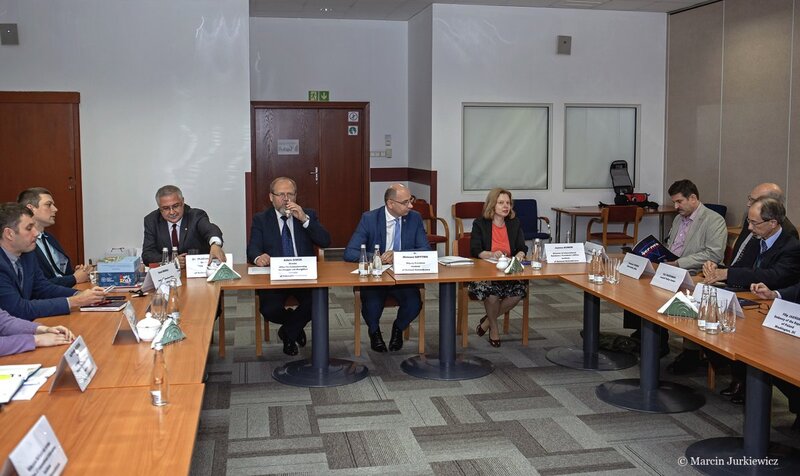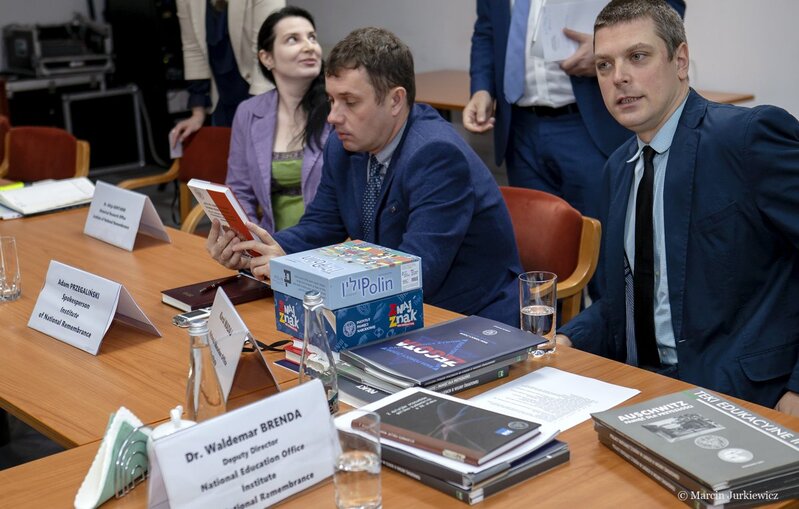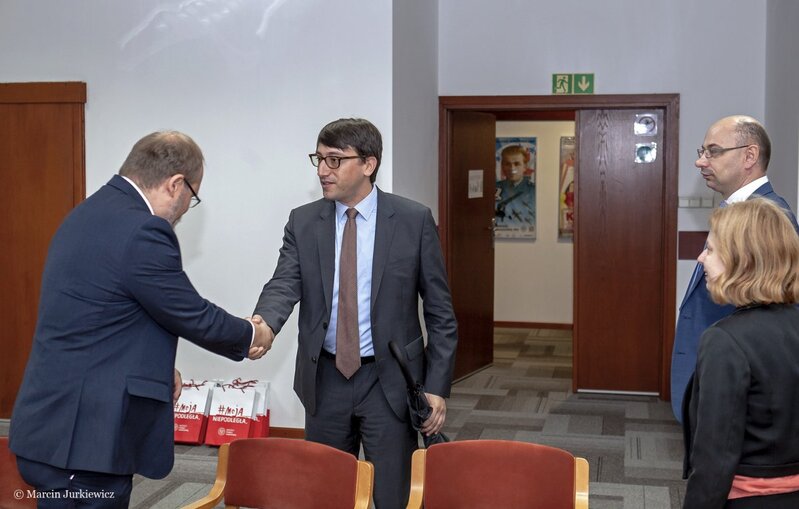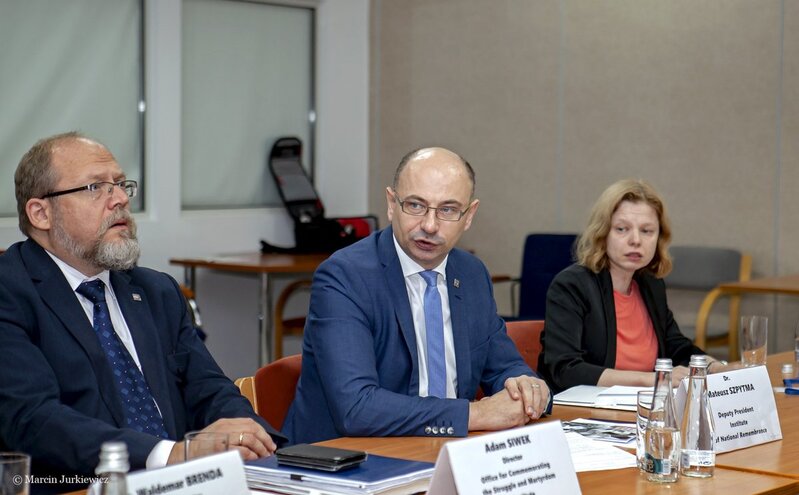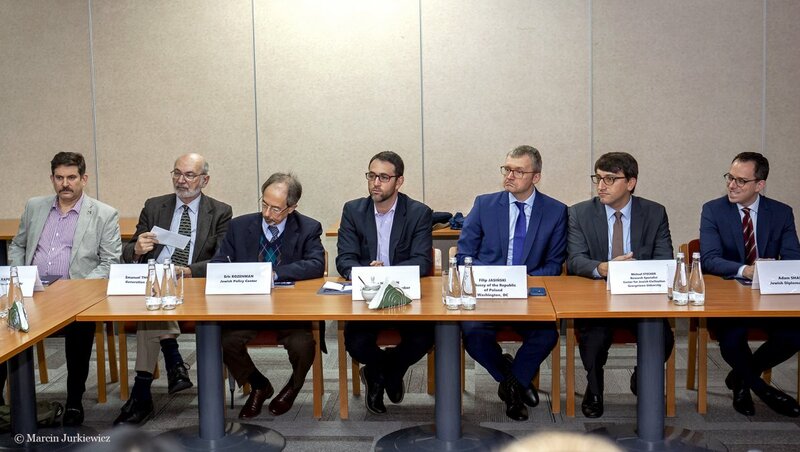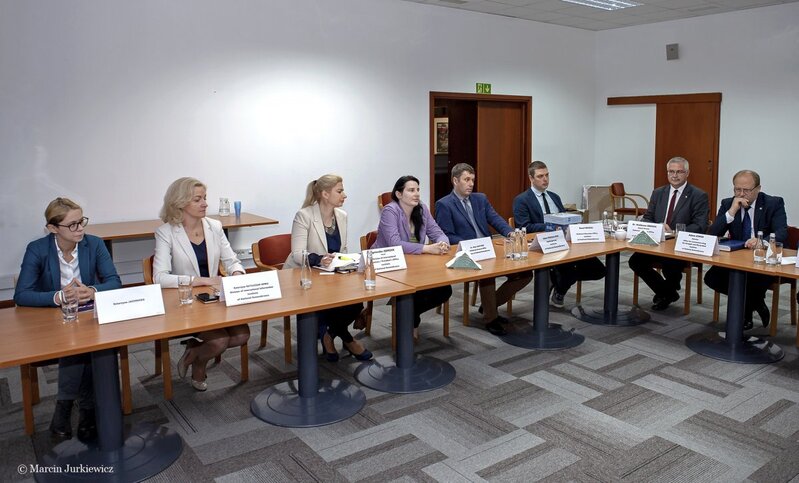The program included visiting ministries, institutions, governmental and non-governmental organizations, Jewish communities and museums. The aim was to present the activities of the above institutions and to indicate the possibility of establishing cooperation and engaging in a dialogue.
The meeting at the IPN was attended by: Emanuel David Thorne (Generation After), Gilead Benjamin Kapen (American Jewish International Relations Institute), Evan Jay Nierman (a Jewish community representative from Florida), Eric Lawrence Rozenman (Jewish Policy Center), Adam Akiva Ephraim Sharon (World Jewish Congress), Michael Joshua Stecher (Georgetown University) and Dr. Filip Maurycy Jasiński from the Embassy in Washington.
The Institute of National Remembrance was represented by: Deputy President of the Institute of National Remembrance - Dr Mateusz Szpytma, Director of the Office for Commemorating the Struggle and Martyrdom - Adam Siwek, Deputy Director of the National Education Office - Dr Waldemar Brenda, IPN spokesman - Adam Przegaliński, Karol Madaj from the IPN’s National Education Office, Dr Alicja Gontarek – Historical Research Office, Katarzyna Ratajczak-Sowa -Independent Section of International Information, Agnieszka Jędrzak - Head of the Division of International Relations and Joanna Kumor - the Division of International Relations.
Dr Mateusz Szpytma, the chairman of the meeting, thanked the guests for their interest in the Institute and presented its origins and tasks, as well as individual substantive departments. He mentioned that the institution was modeled on the German Gauck Institute, which took over the archives of the Security Services of the former East Germany. He further reminded the guests that the former Commission for the Examination of Crimes against the Polish Nation was also incorporated into the Institute and later transformed into what is now the prosecutorial department of the IPN. Finally, due to the fact that the time scope of the Institute has now been extended to 1917, the centre of interest of the institution is not only German or Soviet crimes, but also those committed on the Polish nation by the communists, including during the NKVD Anti-Polish Action in 1937-38.
President Szpytma also mentioned the Archive constituting the heart of the Institute of National Remembrance, housing over 90 km of files. He also presented the activities of the newly created Office of Search and Identification, which deals with finding burial places of Polish heroes who died during two occupations or were either tortured to death or executed in Stalinist prisons.
Director Siwek outlined the main directions of the Office of Commemorating the Struggle and Martyrdom. He emphasized that not only fallen soldiers are entitled to the war grave, but also victims of the crimes of totalitarian regimes. He added that the Polish State is taking care of all the graves of war, regardless of nationality or religion of the people buried in them. He also mentioned the activities of the Office abroad, including taking care of cemeteries of Polish soldiers abroad.
.Director Brenda presented the achievements of the National Education Office (formerly: Public Education Office, out of which the Office headed by him and the Historical Research Office were formed). During eighteen years of activity, about 2,000 academic and popular science titles were published, and about 500 exhibitions were prepared and presented. Dr Brenda also mentioned the History Points project implemented in Poland and abroad and cycles of trainings for teachers. A new tool useful in popularizing history are the board games issued by the Institute, which was discussed by the originator of many of them, Karol Madaj.
Dr Gontarek presented the activity of the scientific department when it comes to examining Jewish issues. As part of the Central Research Project, three research directions are implemented: Polish-Jewish relations, the Holocaust of Jews, and Poles saving Jews. Dr Szpytma mentioned international cooperation in this area and the participation of Polish researchers in conferences and meetings of the International Holocaust Remembrance Alliance (IHRA).
The guests asked about the Institute's cooperation with the Holocaust Museum in Washington. Dr Szpytma mentioned the bilateral agreement concluded between the two institutions. He added that over many years the Museum received numerous copies of documents from the IPN's resources. In cooperation with this institution, archival workshops have also been held.
Representatives of Jewish circles were surprised by the scale of the Institute's activities and their multidirectional dimension. The question was whether among new generations, who do not remember the war or communist times, there has been any fatigue with the constant recalling these events. President Szpytma stated that on the contrary; among young people, there has been a growing interest in these themes, including the issue of the Holocaust, which in a society ruled by communists for many years remained a marginal topic.
At the end of the meeting, guests received gifts in the form of English-language books published by the IPN.
